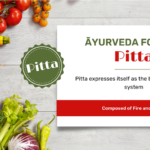
Āyurveda For You – The Vāta Concept
Āyurveda places great emphasis on prevention and encourages the maintenance of health through close attention to balance in one’s life with right thinking, diet, lifestyle and the use of herbs. Knowledge of Āyurveda enables one to understand how to create this balance of body, mind and consciousness according to one’s own individual constitution and how to make lifestyle changes to bring about and maintain this balance.
Āyurveda identifies three basic types of energy or functional principles that are present in everyone and everything called vāta, pitta, and kapha.
Energy is required to create movement so that fluids and nutrients get to the cells, enabling the body to function. Energy is also required to metabolize the nutrients in the cells, and is called for to lubricate and maintain the structure of the cell. Vāta is the energy of movement.
|| तत्र रूक्षो लघु: शीत: खर: सूक्ष्मचलोऽनल: ॥
|| tatra rūkṣo laghu: śīta: khara: sūkṣmacalo’nala: ॥
Vāta is the subtle energy associated with movement — composed of Space and Air. It governs breathing, blinking, muscle, and tissue movement, pulsation of the heart, and all movements in the cytoplasm and cell membranes. In balance, vāta promotes creativity and flexibility. Out of balance, vāta produces fear and anxiety.
Vāta provides the essential motion for all bodily processes and is extremely vital for health. Vāta is most prominent during night time, in the fall and at the change of seasons, older age of one’s life and these are the most important times to be careful of diet and lifestyle.
Vāta Constitution (Vāta Prakṛti)
Person with a prominent vāta (prakṛti) constitution will more often have qualities like quick mind, flexibility and creativity. Mentally, they usually grasp concepts quickly but then forget them just as quickly. Alert, restless and very active. Vāta people walk, talk and think fast, but are easily fatigued. They tend to have less willpower, confidence, boldness and tolerance for fluctuation than other types and often feel unstable and ungrounded.
Vāta types have variable appetite and digestion. They are often attracted to astringent foods like salad and raw vegetables, but their constitution is balanced by warm, cooked foods and sweet, sour and salty tastes.
Vāta resides in the colon, as well as the brain, ears, bones, joints, skin and thighs. Vāta people are more susceptible to diseases involving the air principle, such as emphysema, pneumonia and arthritis. Other common vāta disorders include flatulence, tics, twitches, aching joints, dry skin, and hair, nerve disorders, constipation, and mental confusion. Vāta in the body tends to increase with age as is exhibited by the drying and wrinkling of the skin.
Balancing Vāta
Routine is difficult but essential if vāta is to be lowered and controlled. It is best for vāta types to go to bed early as they need more rest than the other types. In general, people with excessive vāta respond most rapidly to warm, moist, slightly oily, heavy foods. Steam baths, humidifiers and moisture in general are helpful. Daily oil massage before bath or shower is also recommended.
Diet
One should have small meals three or four times a day and may snack as needed while maintaining a two hour gap between each meal. Regularity in meal times is important for vāta. Those with vāta-dominant constitutions do well with one- pot meals such as soups, stews, and casseroles.
Sweet, ripe and juicy fruits are good for vāta
Here are a few examples of fruits and veggies to balance vāta.
- Fruits: Avocado, banana, ripe figs, soaked raisins, coconut, mangoes, peaches, plums, cooked apples, and apricots.
- Vegetables (it should be cooked): Asparagus, beet root, cabbage, cauliflower, carrot, leafy greens, artichoke, okra, onions, cucumber, coriander, garlic, chili green, green beans, pumpkin, zucchini, and spinach.
Sesame oil is warming for vāta, but all oils are good. All dairy products are good for vāta with hard cheese being eaten sparingly. All spices are good, but should not be overused. Intensity itself can be intoxicating to vāta, so one should seek relaxation and meditation to reduce vāta.
General guidelines for balancing vāta:
- Keep warm
- Keep calm
- Avoid cold, frozen or raw foods
- Avoid extreme cold
- Eat warm foods and spices
- Keep a regular routine
- Get plenty of rest
Compiler: Riya Sarolkar Boston, MA



